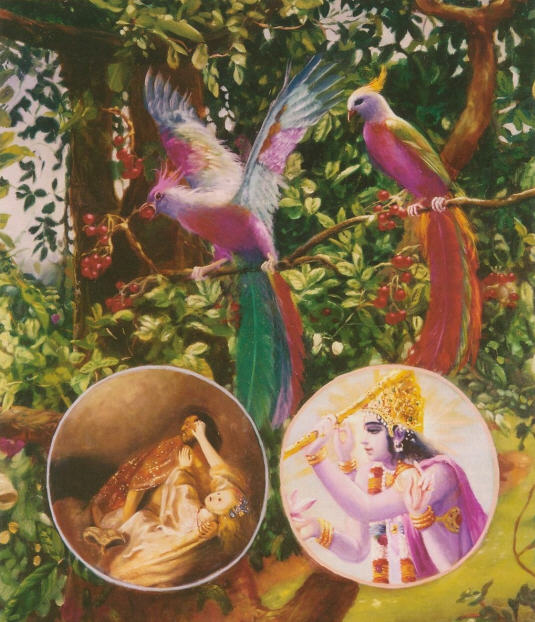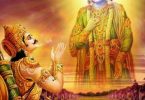Q. At our temple, we are taught that there is the Paramatma and the jivatma residing in our hearts, simultaneously one and distinct. And BG 13.3 is often quoted to prove this. However I also find many other verses especially in BG chapter 11 which makes me think that Paramatma and jivatma are not really distinct. I find myself getting totally confused on what is really correct. Or is it that both are correct at the same time?
Answer by Romapada Swami: The Paramatma and jivatma are two distinct entities – both of them are ‘kshetra-jna’ or the knower of the field of activities. This is the essential message of BG 13.3. The example often given to illustrate this is the description of two birds sitting on the same tree (Cf. BG 2.22 purport). Thus, in every individual body, there reside two souls who are conscious of the entire body – the embodied soul and the Supersoul. The tiny jivatma is the knower of only his own individual body, whereas the Paramatma who is seated equally in everyone’s heart is the knower of all bodies.
Srila Prabhupada explains, “A citizen may know everything about his patch of land, but the king knows not only his palace but all the properties possessed by the individual citizens. Similarly, one may be the proprietor of the body individually, but the Supreme Lord is the proprietor of all bodies.” (BG 13.3 purport) Thus when we speak of the proprietor of the field, it refers both to the citizen as well as the king, two distinct individuals. “The king is the original proprietor of the kingdom, and the citizen is the secondary proprietor.”
Whenever it is mentioned that the individual soul and Supersoul are simultaneously one and different, the oneness aspect is to be understood as follows: just as a spark of fire is to a blazing fire, or a drop of ocean-water is to the entire ocean, or as the finger is part-and-parcel of the body, in the same way the tiny living entity (jivatma) is part-and-parcel of the Supreme Living Entity (Paramatma). The part cannot be equal to the Whole, although qualitatively it is one with the whole. It would not be wrong for someone point to the hand and refer to it as “my body”, and yet the hand itself is not the body. In that sense, qualitatively we are one with the Supreme, but quantitatively infinitesimal.
There *are* circumstances in scripture where the oneness feature is singled out, and no specific mention is made of the simultaneous difference between the jiva and Supersoul; whenever reading these passages, step back and see the bigger picture. The same can be stated, for that matter, re. passages which singularly focus on the difference between jiva and Paramatma. However, in BG 13.3 the same-ness is implicit: both are “jna” or knowers, conscious entities.
It is not clear which particular references lead you to think otherwise and why, but a careful and systematic study of Bhagavad-gita and Bhagavatam, under proper guidance would reveal a very clear, unambiguous and concrete understanding of this principle.







